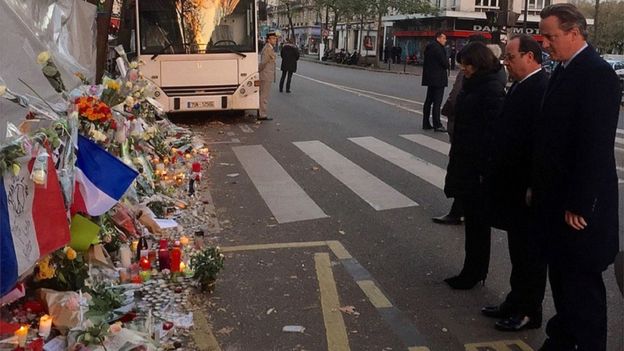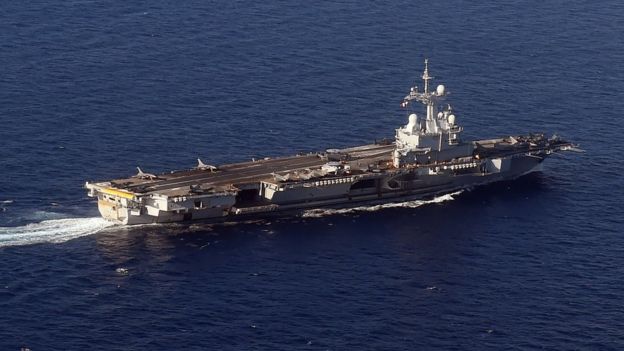Paris attacks: France launches anti-IS strikes from carrier
By BBC News
France has launched its first missions against Islamic State (IS) militants from its Charles de Gaulle aircraft carrier, military sources said.
The newly-deployed carrier has 26 fighters, tripling French capacity.French President Francois Hollande has vowed to intensify strikes against IS in Syria and Iraq after the group said it was behind deadly attacks in Paris.
Belgian police meanwhile said they had arrested five more people in anti-terrorism raids.
France stepped up its bombings of IS following the attacks on Paris, in which 130 people were killed.
The latest series of strikes launched from the Charles de Gaulle targeted sites in Iraq, the French military said.
On Monday, Mr Hollande met British Prime Minister David Cameron for talks as part of a fresh diplomatic push. He will also meet the leaders of the US, Germany and Russia this week.
Mr Hollande said: "We will intensify our strikes, choosing targets that will do the most damage possible to this army of terrorists."
David Cameron: "We will do all in our power to support France to defeat this evil death cult"

Mr Cameron offered his support for Mr Hollande and said it was his "firm conviction" that Britain should also be striking IS in Syria.
Earlier, Mr Hollande and Mr Cameron visited the Bataclan concert hall, where at least 89 people were killed.
The Charles de Gaulle

- France's only aircraft carrier
- Powered by two nuclear reactors
- Took 13 years to make at a cost of about $3.5bn (£2.3bn)
- Weighs 38,000 tonnes, with a runway 195m (640ft) long
- Has suffered a series of technical problems, with part of a propeller breaking during an early test
These arrests bring to 21 the number of people arrested as part of Belgium's ongoing terror alert.
But Salah Abdeslam - suspected of involvement in the Paris attacks - remains at large.
Analysis: Lucy Williamson, BBC News, Paris
This is just the start of Mr Hollande's week of diplomacy. The emphasis in each meeting will be slightly different. Aside from the need to assess the US-led military strategy in the Middle East, there are growing calls from European leaders to improve intelligence- and data-sharing.Security forces in both France and Belgium have been embarrassed by revelations that key suspects behind the Paris attacks moved around freely in the weeks leading up to the assaults, and in the days afterwards, even passing through checkpoints with apparent ease.
And hanging over all the discussion of military and technical co-ordination is the elusive goal of a political solution in Syria that can help eradicate the militants' territory and source of revenue. That's likely to be central to Thursday's talks in Moscow, between Mr Hollande and Vladimir Putin, his fourth national leader in as many days.
As experts point out, France - with its historically cordial ties to Russia, its membership of Nato, and its presence in the Middle East region - is in a unique position to help procure an agreement, and with it greater security at home.


0 Comments:
Post a Comment
Subscribe to Post Comments [Atom]
<< Home